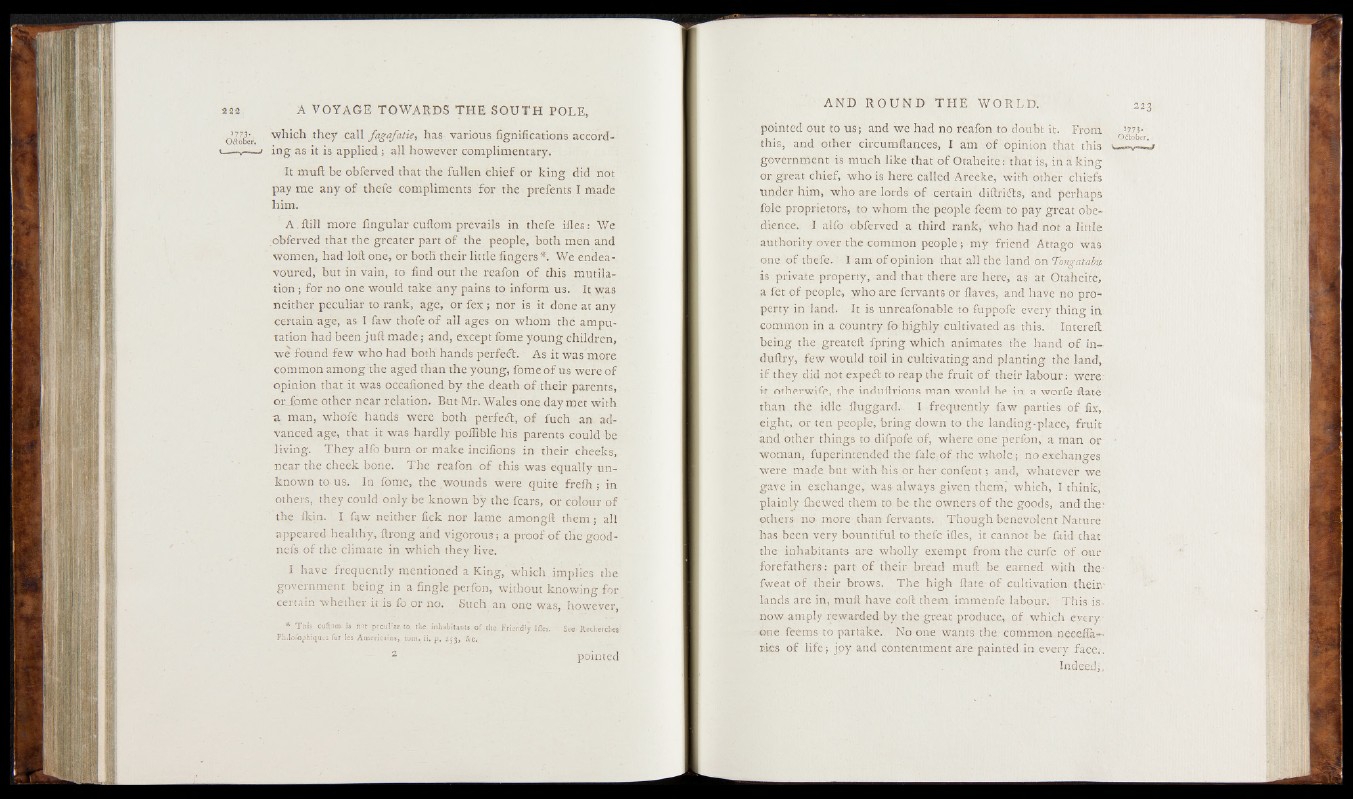
oao&'r 'Which they call fagafatie, has various lignifications accord-
---- ;--- 1 ing as it is applied ; all however complimentary.
It muft be obferved that the füllen chief or king did not
pay me any of thefe compliments for the prefents I made
him.
A . Hill more lingular cuftom prevails in thefe ifles : We
ubferved that the greater part of the people, both men and
women, had loft one, or both their little fingers*. We endeavoured,
but in vain, to find out the reafon of this mutilation
; for no one would take any pains to inform us. It was
neither peculiar to rank, age, or fex ; nor is it done at any
certain age, as I faw thofe of all ages on whotn the amputation
had been juft made ; and, except fome young children,
we found few who had both hands perfect. As it wasmore
common among the aged than the young, fome of us were of
opinion that it was occafioned by the death of their parents,
orjome other near relation. But Mr. Wales one day met with
•a man, whofe hands were both perfect, of fuch an advanced
age, that it was hardly poffible his parents could be
living. They alfo burn or make incifions in their cheeks,
near the cheek bone. The reafon of this was equally unknown
tous. In fome, the wounds were quite frefh ; in
others, they could only be known by the fears, or colour of
the fkin. I faw neither lick nor lame amongft them; all
appeared healthy, ftrong and vigorous; a proof of the good-
nefs of the climate in which they live.
I have frequently mentioned a King,'which implies the
government being in a fingle perfon, without knowing for
.certain whether it.is fo or no. Such an one was, however,
* This cuftom is not peculiar to the inhabitants of the Friendly Ifles. ' See Recherches
Philofo^hiquts fur les Américains, tom. ii. p. 253, &c.
pointed
pointed out to us; and we had no reafon to doubt it. From >773-
this, and other circumftances, I am of opinion that this c— v -
government is much like that of Otaheite: that is, in a king
or great chief, who is here called Areeke, with other chiefs
under him, who are lords of certain diftriefts, and perhaps
fqle proprietors, to whom the people feem to pay great obedience.
I alfo obferved a third rank, who had not a little
authority over the common people ; my friend Attago was
one of thefe. I am of opinion that all the land on Tong a tabu
is private property, and that there are here, as at Otaheite,
a fet of people, who are fervants or Haves, and have no property
in land. It is unreafonable to fuppofe every thing in
common in a country fo highly cultivated as this. Intereft
being the greateft fpring which animates the hand of in-
duftry, few would toil in cultivating and planting the land,
if they did not expedf to reap the fruit of their labour: were:
it otherwife, the induftrious man would be in a worfe ftate
than the idle fiuggard. I frequently faw parties of fix,
eight, or ten people, bring down to the landing-place, fruit
and other things to difpofe of, where one perfon, a man or -
woman, fuperintended the fale of the whole; no exchanges
were made but with his or her confent; and, whatever we
gave in exchange, was- always given therm which, I think,
plainly fhewed them to be the owners of the goods, and the;
others no more than fervants.' Though benevolent Nature
has been very bountiful to thefe ifles, it cannot be faid that
the inhabitants are wholly exempt from the curfe of our
forefathers: part of their bread muft be earned with the:
fweat of their brows. The high ftate- of cultivation their,-
lands are in, muft have coft them immenfe labour. This is.
now amply rewarded by the great produce, of which everyone
feems to partake.. No one wants the common necefla—
lies of life; joy and contentment are-painted in every face.-.
Indeed;,